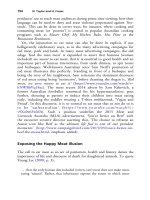The palgrave international handbook of a 489
Bạn đang xem bản rút gọn của tài liệu. Xem và tải ngay bản đầy đủ của tài liệu tại đây (38.79 KB, 1 trang )
Animals in War
491
An End to the Use of Animals in War?
The history of animals in war is horrible, but it is also full of human decency and
sympathy. Case after case of soldiers and civilians feeling pity for animals and
taking special pains to look after them is reported in the literature, as described for
instance by Leinonen (2013, p. 132 and passim), Alger and Alger (2013, p. 98),
and Burnam (2000, p. 75 and passim), among many other examples. As I argue in
Animals and war, then, this paradoxical reality presents a problem. Often, it is war
itself, and its capacity to unravel practically every element of ordinary life, that is to
blame for animal suffering. Often, in circumstances of war, common decency
seems to disappear in behavior toward humans and animals alike, a point that has
special resonance in questions of animal abuse because so many of the arguments
in defense of animals are constructed based on parallels between humans and
animals. When conduct toward other humans grows brutal, it is no surprise that
animals often fall to the same fate. Even today, as humans rely more and more
upon machinery in wartime, animals end up paying all sorts of costs, as demonstrated for example by Kinder in his essay on modern war and the zoo. Kinder
shows how frequently zoo animals become victims of wars in novel ways. Some are
simply killed under the premise of exigency: the nation can no longer afford to
feed them in the lean times of war (2013, p. 57). Others become accidental victims
of social disorder in various ways (2013, p. 55 and passim). Similarly, animals—
often ‘pigs and goats’—are used to test wartime surgical procedures and other
treatments, which require that the animals first be injured by gunshots, chemical
weapons, amputations, and so on, and then treated (Gala, Goodman, Murphy,
Balsam 2012, p. 907 and passim).
Such scenarios suggest that preventing animal abuse in war may require
preventing war altogether. Of course, that is a huge task. But one dimension
of animal studies strikes me as especially promising in promoting a decline in
war: the ability to denaturalize war, the theme with which I opened this
essay. We can continue to expose war as an anomaly of human power with a
comparatively short history—short, that is, in comparison to the age of our
species and the age of mammal life and other life. Too often war is treated as
a kind of fundamental truth, when in fact it is the exception to life on this
planet. No other animal wages war in the same sense that modern humans
do. Chimpanzees, for instance, have sometimes been accused of participating
in war, but I find Pinker’s critique of that idea convincing. He recognizes
instances of chimpanzee on chimpanzee violence, but notes that such cases
tend to happen when aggressors ‘outnumber their victim by at least three to
one’ (2011, p. 38). Other cases of intraspecies violence—in bears, dolphins,









